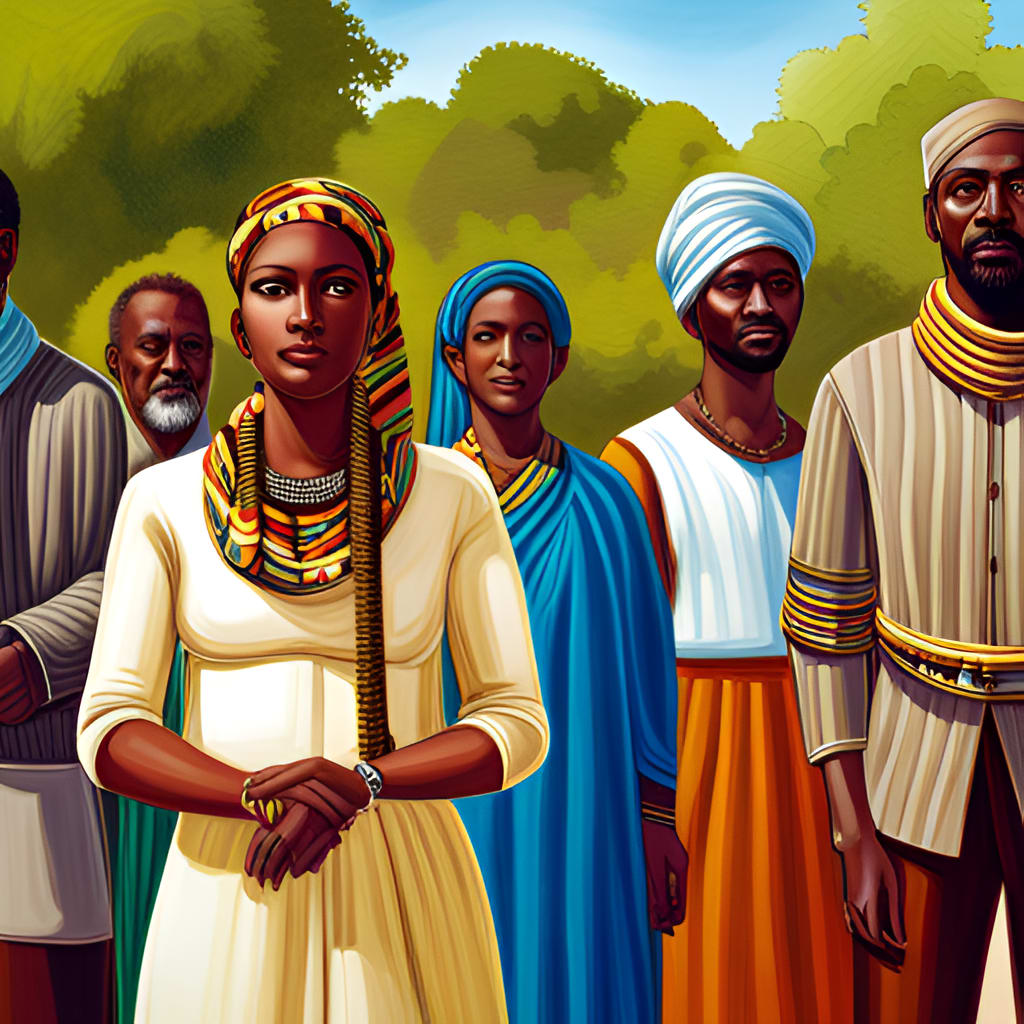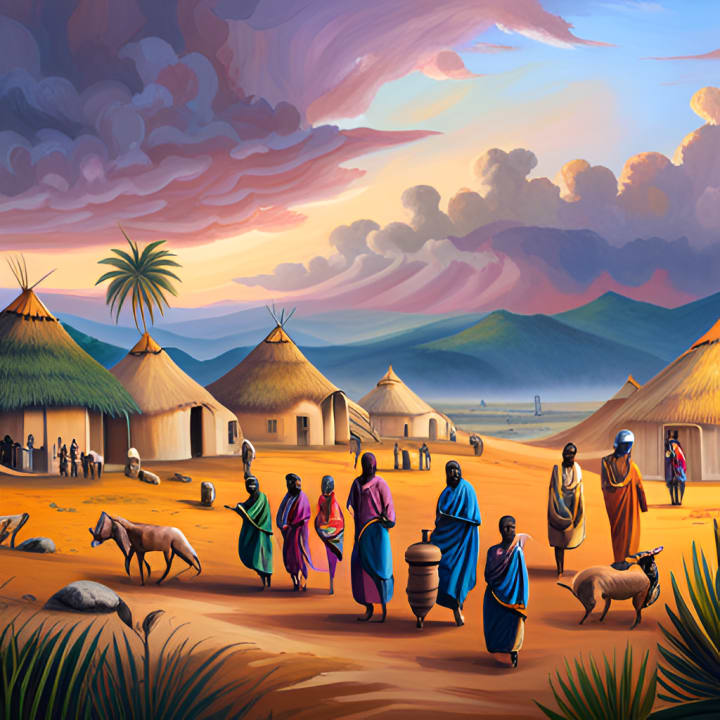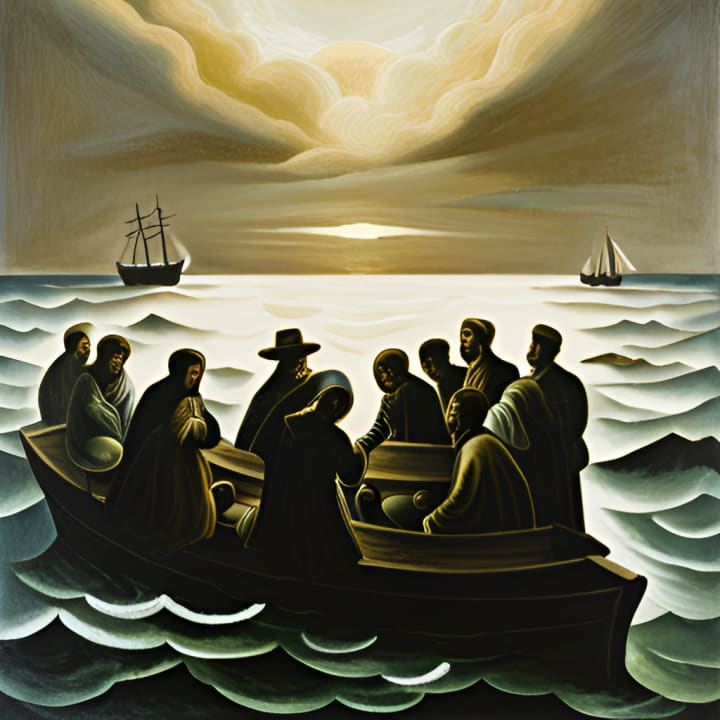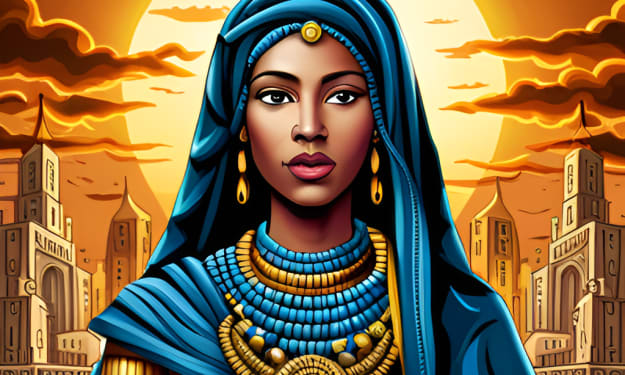Betrayal and Profit: The African Role in the Transatlantic Slave Trade
Unveiling the Complicity and Consequences

Content
Introduction: The Uncomfortable Truth
The African Role in the Slave Trade
The Motivations Behind African Involvement
The Impact of African Involvement
Moving Forward: Acknowledging the Past
Conclusion: Learning from the Past
Introduction: The Uncomfortable Truth
Ladies and gentlemen, today we gather to address a painful reality that has often been ignored or downplayed throughout history - the significant role that Africans played in the transatlantic slave trade. This uncomfortable truth has remained hidden beneath the surface for far too long, hindering our understanding of the complex dynamics involved. It is time to face this truth head-on and engage in an open and honest dialogue.
To embark on this discussion, we must approach the subject with empathy and respect for all parties involved. We recognize that this topic brings forth deep emotions and raises difficult questions about humanity, justice, and the legacy of slavery. It is crucial that we navigate these sensitive waters with care and understanding, acknowledging the immense suffering endured by enslaved Africans and the lasting impact it has had on their descendants.
While we cannot alter the past, we have the opportunity to learn from it and forge a path towards a more enlightened future. By shining a light on the uncomfortable truth of African involvement in the slave trade, we open the door to a more comprehensive understanding of history, one that embraces the complexities and contradictions of human actions. Through this process, we can work towards healing, reconciliation, and a shared commitment to justice and equality.
In acknowledging this uncomfortable truth, we recognize that the transatlantic slave trade was not solely a result of external forces imposed upon Africans. It involved the active participation of Africans themselves, both as individuals and communities, who were complicit in the capture, sale, and transportation of their fellow Africans into bondage. While it is essential to hold individuals accountable for their actions, we must also examine the broader societal, economic, and cultural factors that shaped their choices.
By acknowledging the uncomfortable truth of African involvement in the slave trade, we lay the foundation for a more honest and inclusive understanding of history. This acknowledgement is not meant to assign blame or perpetuate division, but rather to foster a collective responsibility to confront the past and shape a more equitable future. It is through this process of recognition, empathy, and education that we can hope to build a society that values and upholds the inherent dignity and rights of all individuals, regardless of their race or origin.
The African Role in the Slave Trade

The African role in the transatlantic slave trade is a complex and multifaceted aspect of history that warrants careful examination. While discussing this topic may evoke discomfort, it is crucial to acknowledge the involvement of Africans in the capture and sale of their fellow Africans as slaves. It is important to note that slavery was not a foreign concept imposed solely by Europeans, but rather many African societies had pre existing systems of slavery, rooted in cultural, economic, and political factors.
Within African societies, slavery served various purposes, extending beyond labour exploitation. It was not uncommon for slavery to be perceived as a means of punishing criminals or enemies of the state. In some instances, individuals could become enslaved due to debt or as a consequence of warfare. This long-standing tradition of slavery set the stage for the eventual collaboration with European traders.
As the demand for labor in European colonies grew, African rulers and merchants began to recognize the economic potential of engaging in the slave trade. The lucrative nature of the trade enticed some to capture and sell individuals from their own communities. This shift in perception was driven by a combination of factors, including the desire for wealth and resources, the need to establish alliances with European powers, and the influence of the emerging global economy.
The interior regions of Africa became major sources of enslaved individuals as African intermediaries facilitated the capture and transportation of captives to coastal trading posts. While not all Africans participated in the slave trade, it is evident that a significant number were involved. This participation had a profound impact on the overall scale and scope of the transatlantic slave trade. It is important to recognize that the involvement of Africans in the slave trade was not a monolithic experience, as individuals and communities made choices influenced by diverse circumstances, power dynamics, and personal motivations.
By acknowledging the African role in the slave trade, we gain a more nuanced understanding of the historical forces at play and the complex dynamics that shaped this devastating chapter in human history. It is essential to approach this topic with sensitivity and empathy, recognizing the agency and experiences of both the enslaved individuals and those complicit in their exploitation. This comprehensive examination allows us to confront the uncomfortable truths of the past, fostering dialogue, education, and a commitment to creating a more just and inclusive future.
The Motivations Behind African Involvement

The motivations behind African involvement in the transatlantic slave trade were shaped by a complex interplay of economic, political, and cultural factors. It is crucial to recognize that African participation in the trade was not solely driven by greed or malice, but rather a response to the challenges and circumstances of the time.
Economically, the desire for wealth and resources was a significant driving force behind African engagement in the slave trade. European demand for enslaved labour created a lucrative market that presented opportunities for African individuals and communities to acquire valuable goods, such as firearms, textiles, and other commodities. The acquisition of these goods was essential for the survival and prosperity of African societies amidst increasing global trade networks.
Additionally, economic pressures, including the need to pay off debts, compelled some Africans to participate in the trade. In some cases, individuals and communities found themselves trapped in cycles of indebtedness, and selling captives to European traders became a means to alleviate financial burdens and regain economic stability. The trade offered a potential solution to their immediate economic challenges, albeit at a great human cost.
Politically, the slave trade provided an avenue for African leaders to assert power and influence both within their own societies and in relation to European powers. Some rulers strategically engaged in the trade to establish alliances with European traders, thereby strengthening their positions and gaining military advantages over rival factions. The acquisition of European goods and technologies through the trade also bolstered the military capabilities of certain African states, allowing them to expand their territories and enhance their political dominance.
Culturally, the institution of slavery was deeply ingrained in various African societies prior to European arrival. Slavery was often viewed as a legitimate practice, tied to notions of social hierarchy and punishment for criminal behaviour. These cultural beliefs, combined with the prevailing economic and political circumstances, influenced the acceptance and perpetuation of the slave trade within African communities. It is essential to acknowledge that these cultural factors should never be used to justify or diminish the suffering endured by enslaved individuals, but rather to comprehend the complexities of the historical context.
Understanding the motivations behind African involvement in the slave trade allows us to develop a more nuanced and comprehensive perspective. By recognizing the multifaceted nature of these motivations, we can better appreciate the difficult choices Africans faced and the impact of these choices on their societies. It is through this understanding that we can foster a deeper appreciation of the complexities surrounding the transatlantic slave trade and its enduring consequences.
The Impact of African Involvement

The impact of African involvement in the transatlantic slave trade cannot be overstated. It was a profound and far-reaching influence that shaped the course of history and continues to reverberate in our world today. By participating in this brutal system, Africans became both victims and perpetrators of the practice of slavery, leaving a lasting legacy that we must confront and address.
First and foremost, the transatlantic slave trade perpetuated the dehumanization and exploitation of millions of African people. African individuals and communities were uprooted from their homes, forcibly separated from their families, and subjected to inhumane treatment throughout the Middle Passage and their lives as enslaved individuals in the Americas. The psychological, physical, and emotional toll inflicted upon them and their descendants cannot be understated. This deep-rooted trauma has had enduring effects on African diasporic communities, impacting their social, cultural, and economic well-being to this day.
Furthermore, the involvement of Africans in the slave trade had a profound impact on the social fabric of African societies. The capture and sale of individuals, particularly from the interior regions of Africa, disrupted local communities, contributed to social disintegration, and caused profound loss. Families were torn apart, traditional kinship systems were disrupted, and communities were destabilized. The repercussions of this disruption continue to be felt, as African societies grapple with the legacy of fractured social structures and the challenges of rebuilding and healing.
It is important to acknowledge that the choices faced by Africans in participating in the slave trade were often the result of a constrained and oppressive environment. Many Africans confronted limited options and were forced to make difficult decisions in the face of overwhelming power dynamics. While it is necessary to hold individuals accountable for their actions, it is equally important to recognize the systemic factors at play that shaped their choices.
By examining the impact of African involvement in the transatlantic slave trade, we can confront the uncomfortable truth and acknowledge the multifaceted nature of this history. Through a critical and reflective examination of these legacies, we can work towards a better future. This includes addressing the ongoing effects of exploitation and oppression, promoting restorative justice, and fostering greater understanding and empathy among all people. It is through these efforts that we can begin to heal the wounds of the past and build a more equitable and inclusive world.
Moving Forward: Acknowledging the Past

Acknowledging the uncomfortable truth of African involvement in the transatlantic slave trade is an essential step towards building a more just and inclusive future. While we cannot change the past, we have the power to shape our attitude and actions moving forward.
To work towards a better future, we must first recognize and confront the harm that was inflicted during the era of slavery. This requires a collective effort to educate ourselves and others about the complexities of the slave trade and its enduring impact on societies worldwide. By learning about the historical context, we can develop a more nuanced understanding of the systemic factors that allowed the slave trade to persist and the interconnections between different regions and communities.
Acknowledging the past also means giving voice and agency to the descendants of those who were enslaved. Their stories and experiences must be heard and incorporated into the narrative of history. By amplifying marginalised voices and ensuring their perspectives are included in discussions and decision-making processes, we can foster a more inclusive and representative approach to addressing the legacies of slavery.
In addition to education and inclusivity, we must take concrete actions to prevent such atrocities from happening again. This involves advocating for human rights, combating systemic racism, and promoting social and economic justice. By actively working towards dismantling structures of oppression and inequality, we can create a society that values the dignity and worth of all individuals, regardless of their race or ethnicity.
Moving forward also requires fostering dialogue, reconciliation, and healing. This includes engaging in meaningful conversations about the past, acknowledging the pain and trauma caused by the slave trade, and seeking avenues for restorative justice. By addressing historical injustices and promoting healing processes, we can lay the groundwork for a more harmonious and equitable future.
Ultimately, acknowledging the past serves as a powerful catalyst for change. By confronting the uncomfortable truths of African involvement in the slave trade, we can build a society that rejects racism, discrimination, and exploitation in all its forms. It is through our collective efforts, grounded in empathy and a commitment to justice, that we can create a world where the mistakes of the past are not repeated, and where every individual is afforded dignity, equality, and respect.
Conclusion: Learning from the Past
As we conclude our reflection on the uncomfortable truth of African involvement in the transatlantic slave trade, it is essential to recognize the complexity of this history. While it is undeniable that Africans played a role in the capture and sale of their fellow Africans, it is crucial to delve deeper into the economic, political, and cultural factors that influenced their actions.
Understanding the motivations behind African involvement allows us to gain a more comprehensive perspective on the slave trade. It is important to acknowledge that factors such as economic pressures, political ambitions, and cultural beliefs shaped the choices made by individuals and communities. By recognizing this complexity, we can move away from simplistic narratives and engage in more nuanced discussions about the past.
Moreover, we must confront the profound impact that African involvement had on the perpetuation of the slave trade and the dehumanization of Africans. The trade in human lives had devastating consequences that continue to reverberate through generations. By acknowledging this difficult past, we can take meaningful steps towards healing and reconciliation.
Learning from the past is crucial as we strive to build a more just and inclusive society. It requires us to critically examine the mistakes and atrocities committed, and to commit ourselves to a future where all individuals are treated with dignity and respect, regardless of their race or ethnicity. This necessitates dismantling systemic racism, addressing social inequalities, and working towards equality and justice for all.
We must embrace the lessons learned from history and actively engage in the necessary work of creating a better future. By promoting education, fostering empathy, and advocating for positive change, we can ensure that the mistakes of the past are not repeated. It is through our collective efforts that we can build a society where every individual is valued and afforded equal rights and opportunities.
Let us reflect on the lessons of the past and commit ourselves to the ongoing journey towards a more just and equitable world. Only by learning from history and working together can we create lasting change and forge a future where the ideals of dignity, equality, and respect are upheld for all.
About the Creator
Dr. Fred Domezah
Join me on a captivating journey to unravel mysteries, explore scientific breakthroughs, and delve into the complexities of our planet. Get ready to be intrigued as I take you on an exciting voyage of knowledge and discovery.






Comments
There are no comments for this story
Be the first to respond and start the conversation.